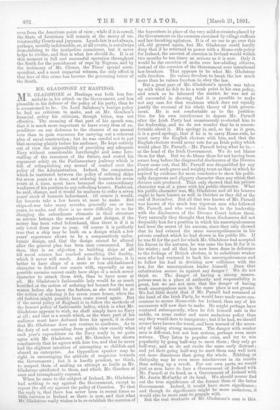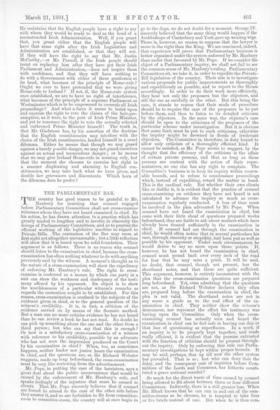MR. GLADSTONE AT HASTINGS. N R. GLADSTONE at Hastings was both
loss for- midable in his attack on the Government, and less plausible in his defence of the policy of his party, than he is accustomed to be. On Lord Salisbury's foreign policy he had no criticism to make, and on Mr. Goschen's financial policy his criticism, though bitter, was not effective. The meaning of that part of his speech was, that it is much more important to leave every item of ex- penditure on our defences to the chances of an annual vote than to gain resources for carrying out a coherent plan of naval construction ; but he was careful not to put that meaning plainly before his audience. He kept entirely out of view, the impossibility of providing any adequate Navy without considerable forethought and some fore- stalling of the resources of the future, and rested his argument solely on the Parliamentary jealousy which is felt of relinquishing any morsel of control over the policy of the Administration. Indeed, the comparison which he instituted between the policy of ordering ships for seven years at a time, and ordering bonnets for seven years at a time, must have betrayed the extraordinary weakness of his position to any reflecting hearer. Fashions, he said, change, and it would be madness to order a seven years' stock of bonnets beforehand. Of course it would, for bonnets take a few hours at most to make. But ships-of-war take many months, generally one or two years, to make, and there is no more difficulty in so far changing the subordinate elements in their structure as science betrays the weakness of past designs, if the money has been voted beforehand, than there is if it is only voted from year to year. Of course it is perfectly true that a ship may be built on a design which a few years' experience shows to be a comparatively unfor- tunate design, and that the design cannot be altered after the general plan has been once commenced. But then, that is an objection to building ships -at all till naval science has reached something like finality, which it never will reach. And in the meantime, it is better to have ships of a more or less old-fashioned character to defend our coasts with, especially as any possible enemies cannot easily have ships of a much newer character to attack them with, than to have none at all. Mr. G-ladstone's fashionable lady would be as much horrified at the notion of ordering her bonnet for the next season before she knew the fashion, as she would be at the notion of ordering it for seven years hence, when the old fashion might possibly have come round again. But if the naval policy of England is to follow the methods of the bonnet policy of fashionable ladies, which is what Mr. Gladstone appears to wish, we shall simply have no Navy at all ; and that is a result which, as the wiser part of his audience must have deduced from his speech, it is clear that Mr. Gladstone does not venture to condemn. As to the duty of not concealing from public view exactly what each year's expenditure on the Navy really is, we quite agree with Mr. Gladstone, and Mr. Goschen has shown conclusively that he agrees with him too, and that he never had the slightest intention of attempting so childish and absurd an enterprise. An Opposition speaker may be right in encouraging the attitude of suspicion towards the Government ; but it is hardly prudent, we think, to suspect them of making an attempt so futile as Mr. Gladstone attributed to them, and which Mr. Goschen at once and triumphantly exposed. When he came to the subject of Ireland, Mr. Gladstone had nothing to say against the Government, except to repeat the old cry against the policy of Coercion. To that the reply is, that there has never been in recent times so little coercion in Ireland as there is now, and that what Mr. Gladstone really wishes is to re-establish the coercion of the boycotters in place of the very mild restraints placed by the Government on the coercion exercised by village ruffians and law-breaking agitators. It is of no use to go over this old, old ground again, but Mr. Gladstone could hardly deny that if he returned to power with a Home-rule policy for Ireland., the amount of coercion in Ireland. would within two months be ten times as serious as it is now. Only it would be the coercion of mobs over law-abiding citizens, instead of the coercion of the Government over intentional law-breakers. That appears to be what Mr. Gladstone calls freedom. He values freedom to break the law much more than he values freedom to obey the law.
But a great part of Mr. Gla,dstone's speech was taken up with what he felt to be a weak point in his own policy, and much as he laboured the matter, he was not at all successful in showing that it is possible to make out any case for that weakness which does not equally justify the reversal of his whole theory of Irish govern- ment. He is not comfortable as to the justifica- tion for his own interference to depose Mr. Parnell after the Irish Party had unanimously re-elected him to the leadership, and we do not wonder that he is uncom- fortable about it. His apology is, and, so far as it goes, it is a good apology, that if he is to carry Home-rule, he must carry the English electors with him, and that the English electors would never vote for an Irish policy which would place Mr. Parnell,—Mr. Parnell being what he is,— at the head of the Irish Government. We do not blame them for that. But we do blame them for not having been aware long before the disgraceful disclosures of the Divorce Court came out, that Mr. Parnell was disqualified ter any position of such grave and weighty trust as that te which he aspired by evidence far more conclusive to show his politi- cally dangerous and slippery character than any which that divorce suit produced. That only showed that his private character was of a piece with his public character. What his public character was, Mr. Gladstone and all his hearers ought to have known as well in October as they did at the end of November. But all that was known of Mr. Parnell was known of the much less vigorous men who followed Mr. Parnell, and who voted him back to the leadership with the disclosures of the Divorce Court before them. Very naturally they thought that these disclosures did not disqualify him for a position in which his unscrupulousness had been the secret of his success, since they only showed. that he had evinced the same unscrupulousness in his private conduct which he had shown in his public life. If he was fit for the part for which Mr. Gladstone had accepted his fitness in the autumn, he was none the less fit for it in the winter ; and all that has now been done in deference to the feelings of British electors, is to substitute weaker men who had ventured. to back his unscrupulousness and to follow his lead in devising new collisions with the law, for the unscrupulous leader himself. Does that substitution secure us against any danger ? We do not think so. The danger of having a strongunscru- pulous man in a place of authority and responsibility is great, but we are not sure that the danger of having weak unscrupulous men in the same place is not greater. We feel little doubt that if Mr. Parnell had remained at the head of the Irish Party, he would. have made more con- cessions to secure Home-rule for Ireland, than any of his successors will now dare to make. He might perhaps have ventured subsequently, when he felt himself safe in the saddle, on some rasher and more audacious policy than any they would dare to inaugurate ; but if be had, we should sooner have known the worst, and. been warned of the neces- sity of taking strong measures. The danger with weaker men is different, but not less serious, perhaps even more serious. They listen to popular cries, and try to win popularity by going half-way to meet them ; they only go half-way, and. so do not excite the same early distrust; and. yet their going half-way to meet them may well turn out more disastrous than going the whole. Nibbling at disloyalty may be even more mischievous in its results than setting up a revolt. For our own parts, we would just as soon have to face a, Government of Ireland with Mr. Parnell at its head, as a Government of Ireland with Mr. Justin McCarthy at its head. We should sooner find out the true significance of the former than of the latter Government. Indeed, it would have more significance ; and though its significance might he more audacious, it would also be more easy to grapple with. But the real weakness of Mr. G-ladstone's case is this. He maintains that the English people have a right to say with whom they would be ready to deal as the head of a reconstructed Irish Administration. Well, if you grant that, you grant either that the English people will have that same right after the Irish Legislature and Administration are established, or that they will not. If they will have the right to say that Mr. Justin McCarthy,—or Mr. Parnell, if the Irish people should insist on replacing him after they have got their Irish Parliament and Administration,—does not inspire them with confidence, and that they will have nothing to do with a Government with either of these gentlemen at its head, what becomes of the principle of Home-rule ? Ought we ever to have pretended that we were giving Home-rule to Ireland ? If not, if, the Home-rule system once established, we are to have no right of interference, what becomes of the principle of a supreme Parliament at Westminster which is to be empowered to overrule all Irish proceedings ? And what a farce it seems to insist upon and exercise the right to veto the claims of the heir-pre- sumptive, as it were, to the post of Irish Prime Minister, and yet to renounce the right to veto the actually selected and enthroned Prime Minister himself ! The truth is, that Mr. Gladstone has, by his assertion of the doctrine that the English constituencies may interfere with the choice of the Irish constituencies, landed himself in a cruel dilemma. Either he means that though we may guard against a barely possible danger, we may not guard ourselves against an actual and tremendous danger ; or he means that we may give Ireland Home-rule in seeming only, but that the moment she chooses to exercise her right in a manner displeasing and alarming to English con- stituencies, we may take back what we have given, and double her grievances and discontents. Which horn of the dilemma does he prefer ?



































 Previous page
Previous page